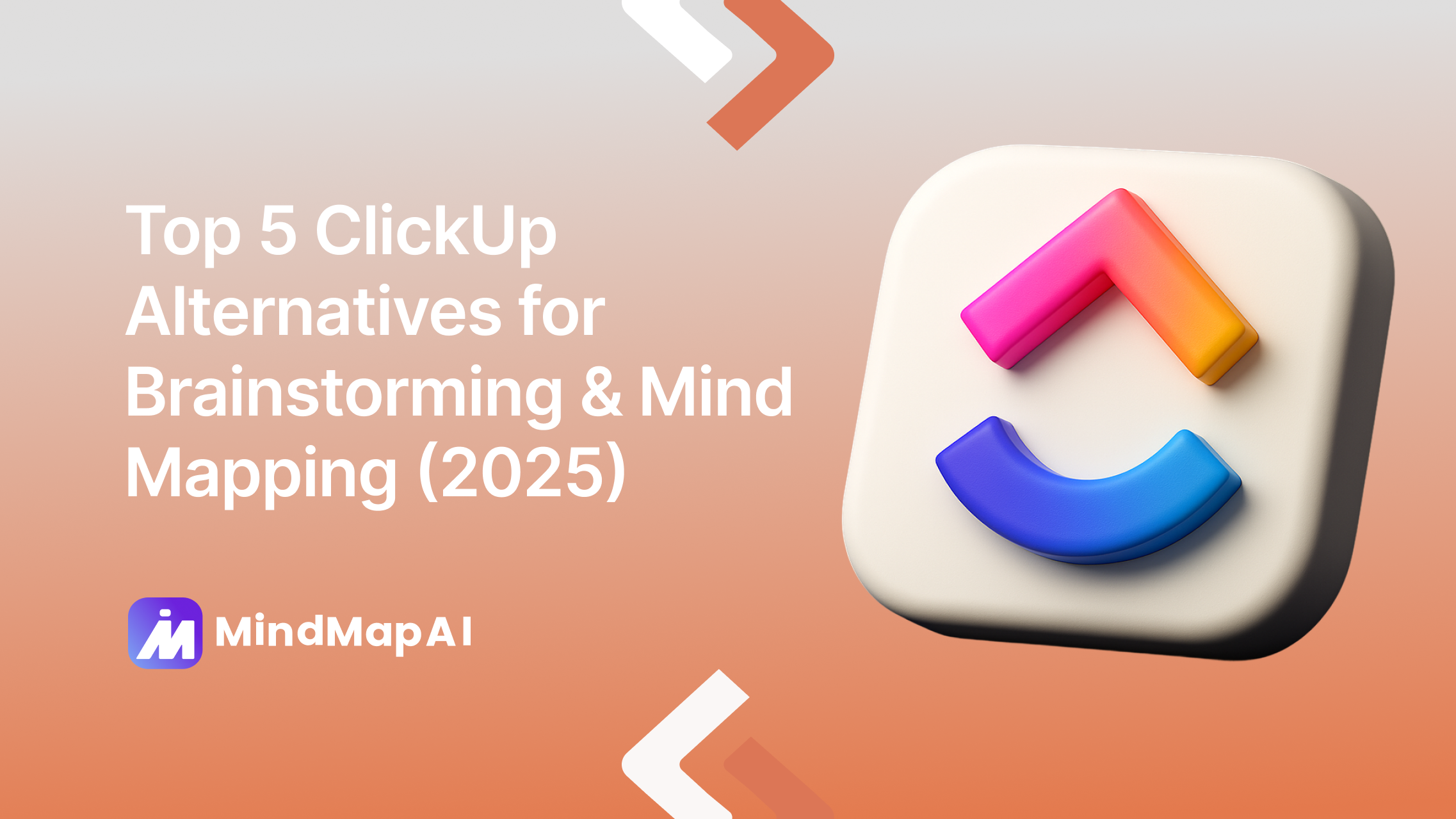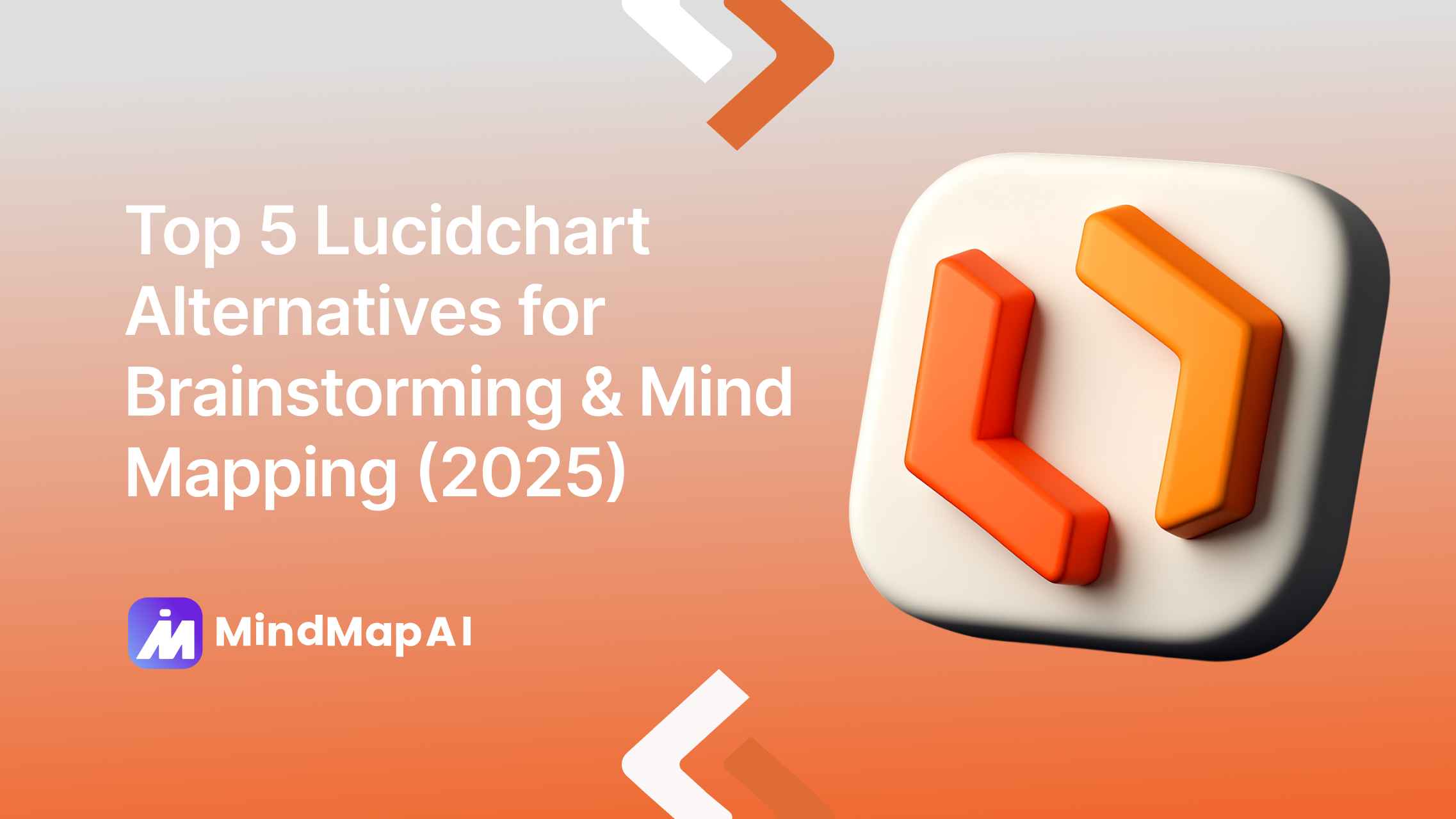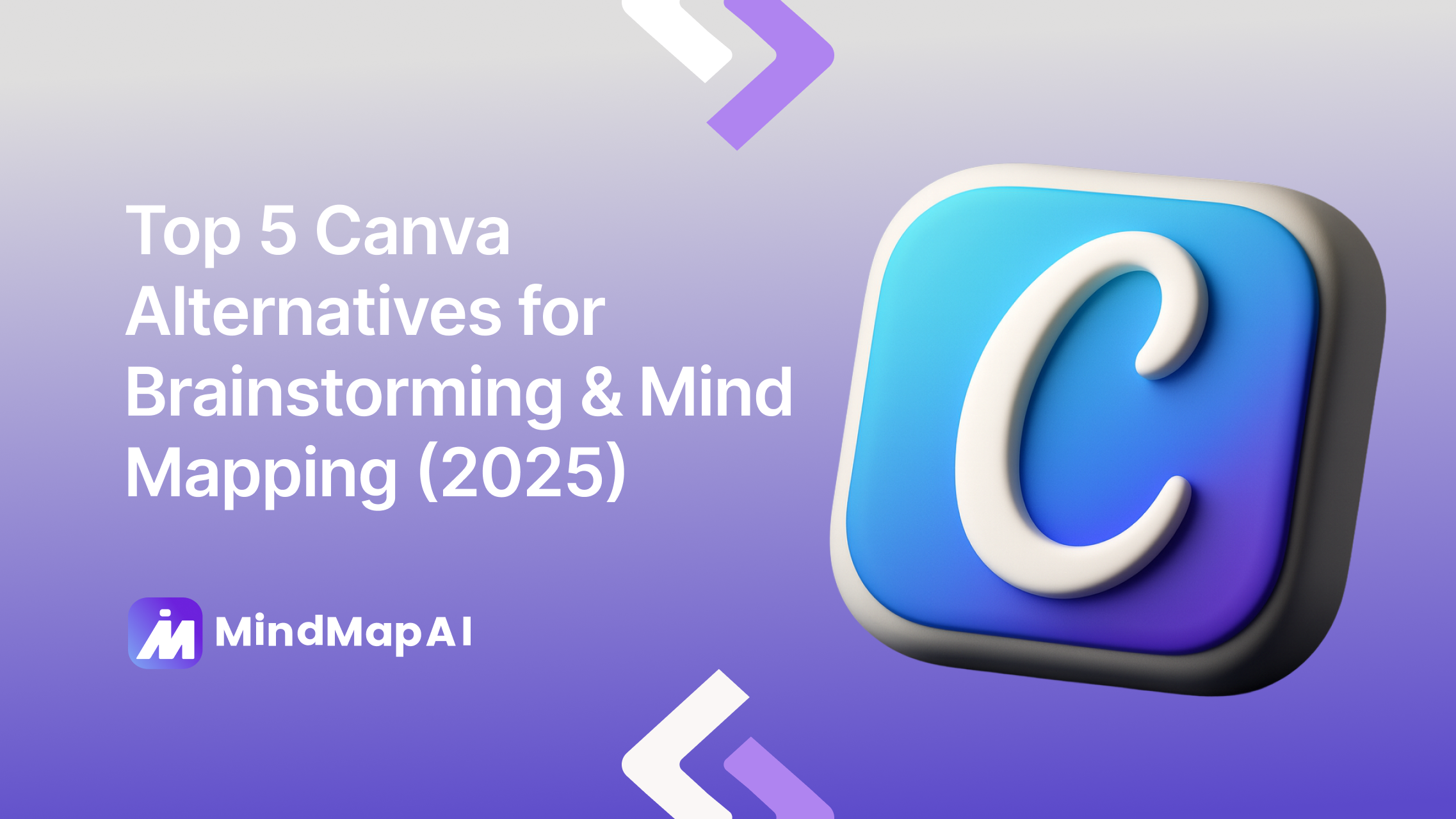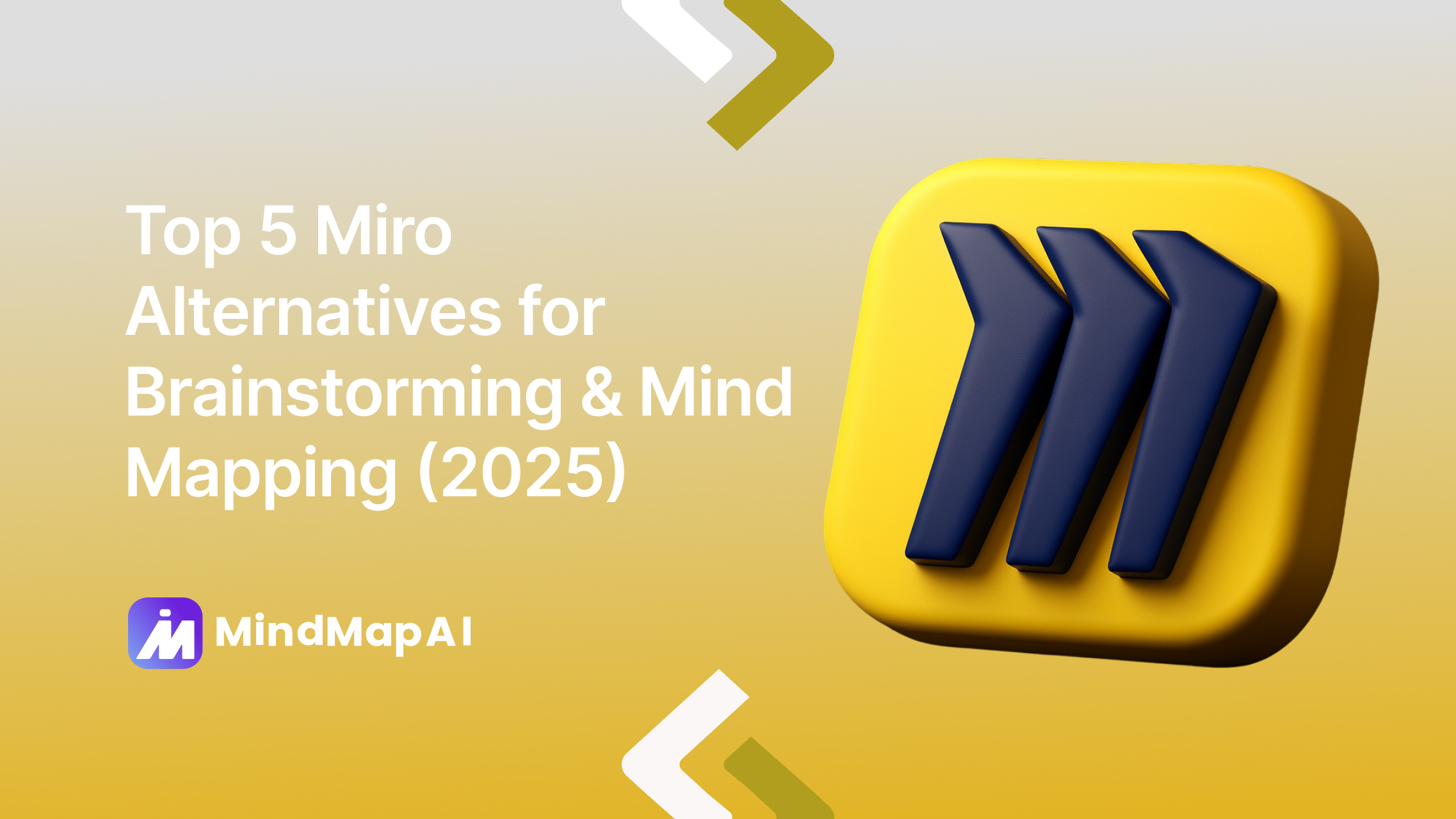
Top 5 ClickUp Alternatives for Brainstorming & Mind Mapping (2025)
ClickUp is one of the most complete productivity platforms out there. It brings tasks, chat, goals, docs, dashboards, whiteboards, and even AI tools together in one place. Its goal of being “the everything app for work” makes it popular with teams that want to replace a bunch of separate tools with a single, unified workspace. With features like ClickUp Brain, AI Notetaker, and Mind Maps, it supports both daily execution and bigger-picture strategy for startups and enterprises alike.
That said, ClickUp’s depth can be overkill if you just want simple brainstorming or quick mind maps. If you’re looking for a more focused, visual-first space for idea generation, creative planning, or academic mapping, the interface and setup can feel heavy. That’s why many people look for lighter, AI-powered options that make brainstorming faster and mind mapping more intuitive.
This guide rounds up the best ClickUp alternatives for brainstorming and mind mapping in 2025, tools that offer smarter visual organization, easy collaboration, and effortless creativity, without the steep learning curve.
Transform your thoughts into stunning AI-powered mind maps in seconds
Why look for ClickUp alternatives?
ClickUp’s superpower is unifying work great for running projects end-to-end. For many teams, though, structured brainstorming, file-to-map generation, and rapid diagramming need deeper, dedicated tools. If you want AI to turn PDFs, notes, audio, or video into an editable map or you run workshops that live on an infinite canvas these alternatives will feel faster and more focused.
1. MindMap AI

Why it stands out
MindMap AI is built for thinking, not just drawing. Drop in text, PDFs, images, CSVs, audio, or video, and it turns them into a structured, editable mind map in seconds. On the same canvas, Copilot Chat lets you expand ideas, summarize long branches, or refocus any topic without switching screens. Second-Order Connections automatically reveal hidden links across your map great for research synthesis, strategy, product planning, and knowledge management when you need both speed and depth.
Unlike ClickUp’s task-centric Mind Map view (which mainly visualizes task hierarchies), MindMap AI is AI-first and visual-first. It supports true file-to-map conversion, real-time AI help, hybrid manual + AI editing, and multi-format exports, so you can go from raw content to a clean, shareable visual in minutes without redrawing anything.
Key Features
Multi-format input to map: Text, PDFs, images, CSV, audio, video and more.

AI Copilot Chat: Summarize, expand, rephrase, and focus topics in real time.

Second-Order Connections: Auto-detect related ideas to reveal hidden links and patterns across branches.

Flexible exports & sharing: Export PNG, SVG, PDF, Markdown, CSV, project files; share via private/public links for fast feedback or hand-off.

Apps & extensions: iOS, Android, Chrome & Edge extensions for quick capture from the web.
Version history & cloud storage: Full change history with anywhere access.
Pros
AI handles the heavy lifting: Instant generation, branch expansion, summaries, and topic focus save serious time.
Works with your real inputs: Notes, reports, lectures, recordings, not just typed prompts.
Generous free plan plus student discounts.
Flexible pricing: Affordable annual plans and lifetime option.
Richer standalone exports than generalist whiteboards or PM suites.
Cons
No real-time co-editing yet (share via links; collaborators work from their copy).
Fewer decorative templates than design-first whiteboarding suites.
Pricing
Free: 50 AI credits/month
Basic: $3.74/mo billed yearly (2,000 credits)
Pro: $7.49/mo billed yearly (5,000 credits)
Add-on credits from $4.99; lifetime plans available
Still using ClickUp for brainstorming? See how MindMap AI outperforms it in AI mapping.
2. Canva

Why it stands out
Canva has grown from a pure design tool into a full Visual Collaboration Suite that brings whiteboards, documents, presentations, and basic mind mapping into one workspace. With Canva Whiteboards, you can brainstorm with sticky notes, connect ideas using templates, and co-edit in real time while pulling from Canva’s huge library of visuals, icons, and illustrations. It’s a great fit for teams who want fast, polished brainstorming without the complexity of advanced diagramming tools.
Everything connects smoothly: ideas captured on Whiteboards can flow straight into Docs or Presentations for shareable slides and branded deliverables. Brand Kits and approval workflows keep every board and diagram on-brand. Whether you’re an educator planning lessons, a marketer shaping a campaign, or a designer running a workshop, Canva blends accessibility, visual polish, and collaboration in one place.
Key features
Whiteboards with real-time collaboration and prebuilt templates
Massive library of photos, graphics, videos, and fonts
Brand Kits, approval flows, and team workspaces
Integrated Docs and Presentations for seamless workflow
Desktop and mobile apps with education and nonprofit programs
Pros
Fastest way to create visually appealing mind maps and whiteboards
Extensive template and media libraries
Excellent for teams that value visual communication and brand alignment
Cons
Mind mapping remains manual or template-based (no automatic AI mapping)
Limited export support for structured data formats like CSV or OPML
Pricing
Free tier available; Pro, Teams, and Enterprise plans unlock advanced templates, premium assets, and collaboration features.
3. Miro

Why it stands out
Miro is one of the best-known tools for collaborative brainstorming and visual thinking an AI-powered Innovation Workspace built for teams that care about ideas, alignment, and execution. It gives you an endless canvas to co-create customer journey maps, product roadmaps, strategy boards, and flowcharts. With 6,000+ templates and frameworks, you can kick off workshops fast, while Miro AI cleans up messy brainstorms into clear diagrams and summaries.
Unlike traditional mind-mapping apps, Miro works as a full ecosystem for ideation, planning, and delivery. You can embed documents, tables, slides, and diagrams on one interactive board, use TalkTrack for async walkthroughs, collaborate live, and rely on Enterprise Guard-level security. For teams running workshops, design sprints, or cross-department research, Miro’s scalability, governance controls, and deep integrations make it a standout choice for enterprise-grade visual collaboration.
Key features
Intelligent Canvas combining docs, slides, tables, and diagrams
Miro AI for summarizing, cleaning, and structuring brainstorms
6,000+ templates and automated Blueprints for workflows
250+ integrations (Atlassian, Microsoft, Google Workspace, etc.)
TalkTrack async walkthroughs and enterprise-level governance
Pros
Best-in-class template library and facilitation tools
Deep enterprise readiness with strong integration ecosystem
Excellent for product teams, strategists, and facilitators
Cons
Mind mapping is one of many features (not AI file-to-map focused)
Can feel heavy for solo users or simple visual brainstorming needs
Pricing
Free plan available; Team, Business, and Enterprise tiers offer advanced features, security controls, and automation for larger teams.
4. Lucidchart

Why it stands out
Lucidchart is one of the most powerful intelligent diagramming tools around, helping you turn ideas into precise, structured visuals. While ClickUp focuses on task execution, Lucidchart is built to translate thinking into accurate, data-connected diagrams, everything from process flows and org charts to UML, ERD, and system architecture. With Lucid AI, you can now generate diagrams from plain text or summarize complex visuals into quick, digestible overviews, making the jump from ideation to clarity much faster.
As part of the Lucid Suite, Lucidchart works seamlessly with Lucidspark (whiteboarding) and Lucidscale (cloud architecture) to create a unified space for planning, mapping, and delivery. Technical teams, product designers, and business analysts can tap into features like data linking, conditional formatting, and diagram-as-code for dynamic, scalable diagrams. For enterprises that need strong compliance, version control, and deep integrations with Atlassian, Microsoft, Google Workspace, Notion, and Slack, Lucidchart delivers top-tier reliability and governance for visual collaboration.
Key features
Lucid AI for diagram generation, summaries, and refinements
Diagram-as-code, data linking, and conditional formatting
Cloud libraries for AWS, Azure, and GCP architectures
Deep integrations with major enterprise tools
Part of the Lucid Suite with Lucidspark for ideation and collaboration
Pros
Exceptional for process mapping, technical documentation, and system design
Enterprise-grade governance, training, and compliance features
Ideal for teams needing structured visuals over casual whiteboarding
Cons
Overkill for simple brainstorming or quick sticky-note sessions
Mind mapping exists but is secondary to diagramming and process visualization
Pricing
Free plan available; Individual, Team, and Enterprise tiers unlock advanced AI tools, integrations, and collaboration options.
5. Mural

Why it stands out
Mural is a facilitation-first visual collaboration platform that helps teams turn ideas into alignment and real outcomes. Built for enterprise workshops and strategic planning, it combines an infinite canvas with powerful facilitation tools like timers, voting, private mode, and ready-to-use templates. Mural AI makes sessions even stronger by organizing messy ideas, creating summaries, and surfacing key insights automatically. It’s ideal for strategy sprints, retrospectives, and cross-functional planning where visual clarity and structure matter.
What sets Mural apart from ClickUp alternatives is its deep integration with Microsoft 365 and Copilot, so Teams users can embed visual collaboration right into their existing workflows. Consultants, project managers, and enterprise facilitators will appreciate its LUMA-certified methods, built-in enterprise governance, and proven ROI from better engagement and faster decisions. Mural isn’t just for brainstorming, it ensures every session ends with clear next steps and shared understanding across distributed teams.
Key features
Real-time collaborative workshops with templates and facilitation tools
Mural AI for organizing, summarizing, and accelerating insights
Deep Microsoft 365 and Copilot integration for Teams users
Enterprise services, LUMA frameworks, and proven governance structure
Pros
Purpose-built for workshops, retros, and stakeholder alignment
Exceptional integration with Microsoft Teams and enterprise systems
Strong track record for improving meeting efficiency and collaboration outcomes
Cons
Mind maps are template-based rather than AI-generated from files
Focused more on facilitation and alignment than research automation
Pricing
Free plan available; Business and Enterprise tiers include AI features, advanced templates, and facilitation toolkits for large-scale organizations.
Not sure which tool fits your style?
Comparison at a Glance
| Tool | Mind-map focus? | AI features | Best for | Free plan? | Platforms |
|---|---|---|---|---|---|
| MindMap AI | Yes (AI-first) | Copilot Chat, file→map, summarize, focus, second-order links | Students, researchers, creators | Yes | Web, iOS, Android, Chrome/Edge |
| Canva | Whiteboards + simple maps | AI design helpers; manual maps | Fast, beautiful visual boards | Yes | Web, desktop, mobile |
| Miro | Whiteboarding + maps | Miro AI; Blueprints | Enterprise workshops & product planning | Yes | Web, desktop, mobile |
| Lucidchart | Diagramming + concept maps | Lucid AI (generate/summarize) | Technical diagrams & process maps | Yes | Web, desktop apps, mobile |
| Mural | Whiteboarding (maps via templates) | Mural AI + Microsoft 365 | Facilitation, consulting, MS 365 orgs | Yes | Web, desktop, mobile |
FAQs
Q: Why look for ClickUp alternatives specifically for brainstorming and mind mapping?
A: ClickUp shines at project and task management, but idea capture there is often manual and task-centric. If you want AI to turn notes, PDFs, audio, video into maps, or a lighter canvas for rapid ideation, tools like MindMap AI, Miro, Mural, Lucidchart, and Canva can be faster and more focused.
Q: Are there good free options to trial before switching?
A: Yes. MindMap AI has free plan with 50 AI credits/month, unlimited manual maps, watermark-free exports, and Miro, Mural, Canva, and Lucidchart all have free tiers, so you can test fit without commitment.
Q: Does ClickUp support AI mind map generation from content?
A: Not yet. ClickUp AI focuses on text summarization, note generation, and writing assistance, but not file-to-map automation. MindMap AI fills that gap, it can generate a complete mind map from PDFs, audio, videos, or CSVs in seconds.
Final Takeaway
ClickUp’s power lies in its ability to centralize everything, but sometimes, less is more. For teams and individuals who value clarity, speed, and creativity, the top ClickUp alternatives of 2025 deliver streamlined interfaces and built-in AI tools that make visual thinking effortless.
MindMap AI stands out as the best ClickUp alternative for visual brainstorming and structured mind mapping. Instead of navigating hundreds of settings, users can use Mindmap AI tools or simply input text, PDFs, videos, audio and instantly generate a fully editable, AI-driven mind map. Features like AI Expand, Summarize, and Focus Topic help refine complex ideas, while Copilot Chat keeps brainstorming flowing naturally. You can export your results to PDF, Markdown, or project formats bridging the gap between creative ideation and actionable planning.
If ClickUp feels too heavy for your brainstorming workflow, MindMap AI offers the ideal balance of AI intelligence and visual simplicity making it the ultimate tool for structured, creative thinking in 2025.








